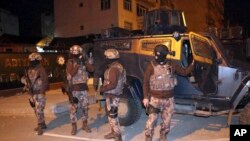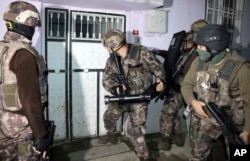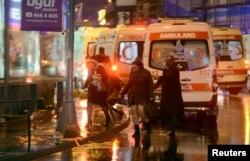Since early Sunday, Turkish police have been breaking down the doors of suspected Islamic State members, detaining more than 700 people across the country.
More than 30 people were detained in Istanbul, many in the area where a gunman responsible for the New Year's nightclub attack was captured by police last month.
That attack, which killed 39 people, spurred an unprecedented crackdown on the terrorist group.
"Even before this recent attack, it was a major threat to Turkey’s security,” said Haldun Solmazturk, who heads the 21st Century Turkey Institute, an Ankara-based research institution, “and now it is an even bigger threat, because it has a terror infrastructure within Turkey. It has clear aims and purposes."
Dozens were arrested in the city of Izmir, and according to local news reports, an imminent attack was foiled. Analysts say this latest crackdown is on an unprecedented level nationwide, with arrests in 29 provinces.
So-called Islamic State is believed to have built up a national network, created to smuggle people from across the globe into neighboring Iraq and Syria. Foreigners and Turkish nationals are among those who have been detained.
Critics have accused the government, and even some of its Western allies, of turning a blind eye to the threat, being more interested in bringing down the Syrian regime.
“In a sense they were given a free hand to further radicalize Turkish society,“ says analyst Solmazturk, “and now it’s a huge threat, in a sense, it’s a beast of our own creation.”
Experts say many jihadists arrested in previous crackdowns were subsequently released, in what has been dubbed a "revolving door" policy. Turkish media have reported one of those arrested in connection with the Istanbul New Year’s attack was detained last year and set for deportation, but instead was let go.
"Turkey has changed its position towards the Islamic State,” notes Sinan Ulgen, visiting scholar of the Carnegie Europe Institute in Brussels, "and is now involved in a bitter struggle, in a military campaign against Islamic State. Turkey will remain a target for the Islamic State militants for the foreseeable future."
Turkey's government has promised to eradicate Islamic State, and Turkish soldiers are currently fighting the jihadist group in neighboring Syria. IS has vowed revenge.
Analysts warn that Turkish security forces are now engaged in a race against time.
The security forces, however, are facing are ongoing purge within their ranks. Tens of thousands of police officers, prosecutors, intelligence and army offices have been arrested or dismissed. They have been accused of being followers of the U.S.-based cleric Fethullah Gulen, blamed by Ankara for July’s failed coup.
Analyst Ulgen says the purge inevitably raises questions over the effectiveness of Turkish security forces.
“The government has started to purge the administration from the Gulen influence. This has incapacitated to some extent the same entities that are responsible for providing security. So the functional, the operational effectiveness of these institutions has seemingly been affected or that is at least the conclusion we can reach since the Turkish government most tragically was not able to preempt or prevent a series of attacks which we have seen in recent months.”
Since July, Islamic State and the Kurdish rebel group the PKK have carried out a series of major attacks, killing more than 100 people.
The government refutes allegations the purge has impacted the effectiveness of the security forces and has warned of the need for further waves of arrests and dismissals, maintaining that followers of Gulen are just as dangerous to Turkey as Islamic State.
That stance leads some in Turkey to continue to question the government’s priorities in the war against Islamic State. “Even now we are not at a position that a firm decision, with political determination, has been made to fight back against Islamic State,” warns analyst Solmazturk.






